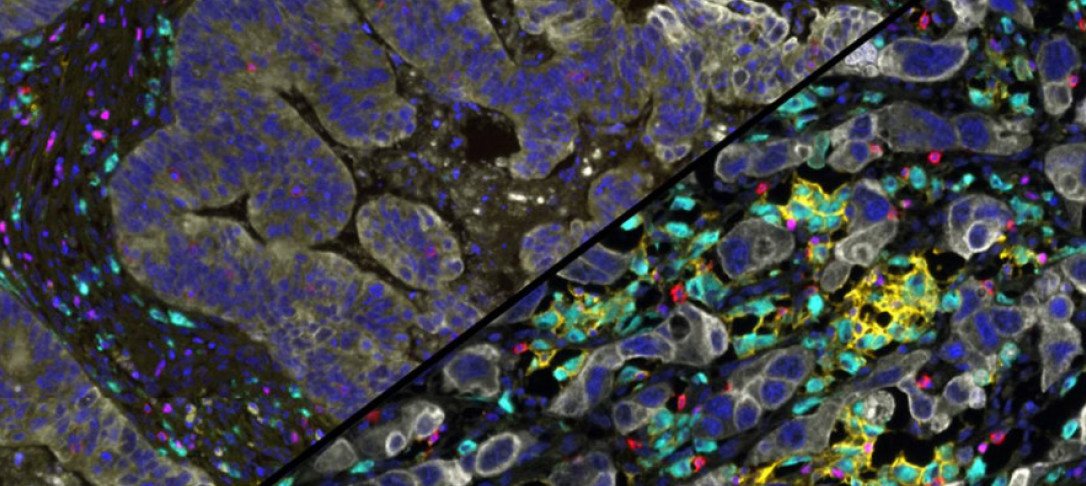
In this series of webinars brought to you by the Cancer Research UK Convergence Science Centre at Imperial College London and The Institute of Cancer Research, London, researchers across the two organisations will discuss key challenges facing cancer research and opportunities for new convergence science approaches to address these. Join us to consider how novel approaches and technologies could shed light on unresolved problems in cancer biology, to innovate new ways to address challenges in cancer and bring pioneering treatments to cancer patients faster.
Hosted by the Convergence Science Centre’s Scientific Director Professor Axel Behrens, the series aims to support the Centre’s mission to facilitate collaboration between traditionally separate and distinct disciplines.
Please join us on Tuesday 27th July, from 15.00-16.00, for two talks from:
Dr Navita Somaiah – The Institute of Cancer Research and The Royal Marsden NHS Foundation Trust
‘Convergent imaging and sensing solutions for personalised radiotherapy’
There is a clear unmet need for the development of robust minimally invasive imaging and circulatory biomarkers in order to tailor radiotherapy based on response of both tumours and dose-limiting normal tissues. For example, early prediction of radioresistance will enable selection of patients for novel drug/immune-RT combination therapies. De-escalation strategies in patients with radiosensitive tumours will allow better sparing of late RT-related toxicities. In this talk Dr Somaiah will highlight the role of convergence science in addressing some of these problems using examples from ongoing projects investigating 3D-super resolution ultrasound, radiomic/AI analysis of MRI and nanopore-based size profiling of cell-free DNA.
Dr Navita Somaiah is a Clinician Scientist and Team Leader in the Division of Radiotherapy and Imaging at The Institute of Cancer Research, London (ICR), and an Honorary Consultant Clinical Oncologist in the Breast Unit at The Royal Marsden NHS Foundation Trust. She leads the translational breast radiotherapy and radiobiology team at ICR. After completing her DPhil in radiation biology at the University of Oxford, she became the first recipient of an ICR Clinician Scientist Fellowship award. Her research focuses on biological optimisation of radiotherapy by improving tumour response whilst minimising normal tissue toxicity, for a truly personalised approach. She is the chief investigator of the international Phase I/II KORTUC trial that is looking at innovative approaches to tackling tumour hypoxia and radiosensitisation. She leads several translational studies, in particular two neoadjuvant breast radiotherapy trials at RM/ICR aimed at defining the radiation-induced immune landscape in primary breast cancers for optimal radio-immunotherapy combinations.
&
Professor Joshua Edel – Imperial College London
‘Multiplexed detection of soluble proteins and other biomarkers in unprocessed clinical samples’
There is an enormous need for analytical methods that can achieve simultaneous detection of multiple soluble proteins and other biomarkers in complex biological fluids. A technology that can achieve this holds the promise of far-reaching impact in multiple healthcare grand challenges both in point of care diagnostics and monitoring disease progression. In this talk Professor Edel will report on a nanopore technology that can be used to detect proteins and miRNA at the single molecule level. This is achieved via synthesis of molecular probes that can be used to confirm concentration and presence of a particular biomarker. Each probe contains an aptamer sequence for the detection of protein biomarkers or other biomarkers. Detection is validated in clinical samples from patients and control groups. This technology offers great promise for the identification as diagnostic/prognostic biomarkers and validation of emerging biomarkers rapidly and with high sensitivity.
Joshua Edel is Professor of Biosensing and Analytical Sciences within the Department of Chemistry at Imperial College London. He is an expert in the development of trace analyte analytical platforms including bioanalytical sensors for use with clinical samples. He has published over 150 research articles and has given more than 140 invited talks. In 2011 he was awarded a prestigious ERC StG grant on rare event bioanalysis and in 2017 he was awarded an ERC Consolidator award related to the development of selective single-molecule biosensors. Professor Edel has pioneered techniques such as high throughput droplet microfluidics, Nature Chemistry (2011), optical and electrical single-molecule sensors Nature Communications (2017, 2019), plasmonic nanopore sensors Nano Letters (2015), self-assembly at immiscible interfaces Nature Materials (2013, 2017), and nanoscale probes, Nature Nanotechnology (2019). He has been funded by organisations such as EPSRC, ERC, Wellcome Trust, British Heart Foundation, DstL, Wellcome Trust, CRUK, BBSRC, as well as industrial partners and actively acts as a consultant in biosensing.
Registration
To receive information about how to access this event please email icr-imperial-convergence.centre@imperial.ac.uk
Please note: This webinar is exclusively available only to colleagues across the Institute of Cancer Research, Imperial College London, the Royal Marsden Hospital and Imperial College Healthcare.